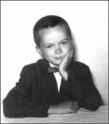About TWD
The Word Detective on the Web is the online version of The Word Detective, a newspaper column answering readers’ questions about words and language. The Word Detective column was written by Evan Morris, and appeared in newspapers in the U.S., Mexico and Japan.
Since 1995, Word Detective columns have been posted on the web a few months after they were carried in newspapers. All columns eventually appear, in complete form, free for anyone to read, on this web site.
————————————————-
This is the introduction to The Word Detective, a collection of these columns published by Algonquin Books in 2000:
Introduction
It all started with sticky dimes. It was 1958, I was eight years old, and my older sister and I sat in the library of my family’s home in suburban Connecticut, opening the dozen or so envelopes that had arrived in the day’s mail. Each envelope contained ten cents in some form — usually dimes or nickels taped securely to small pieces of cardboard, but sometimes a hodgepodge of stamps — and it was our job to extract the loot and sort it dutifully into plastic salad bowls. A grownup would probably have regarded our task as tedious, but we, innocent of child labor laws, had begged our parents to let us open the letters.
In my eight-year-old world, encountering just one letter containing actual money would have been a memorable event. A pile of such magic envelopes was a postal miracle that boggled my small mind, on a par with having the Tooth Fairy drop by for dinner. As a matter of fact, I was beginning to have my doubts about the Tooth Fairy’s existence, but here was solid evidence of a Mail Fairy out there somewhere with an apparently inexhaustible supply of sticky dimes.
To my parents, however, the dimes were simply the fruits of a good idea. My father was Editor-in-Chief of Grosset & Dunlap, a large publishing firm in New York City. Several years earlier he had begun writing a syndicated newspaper column called Words, Wit and Wisdom, answering readers’ questions about word origins and language usage, and he had learned several useful things about his readers from the questions they sent in. His readers were very insecure about the size of their vocabularies, they were similarly worried about making grammatical errors, and they were fascinated and often mystified by “teen” slang. My parents’ good idea was to produce simple, helpful pamphlets on each of these topics and market them through my father’s column for ten cents each. The response from readers was phenomenal, and soon my sister and I were stuffing envelopes with copies of “The Morris Self-Scoring Home Vocabulary Test,” a hipster glossary called “The Real Gone Lexicon” and similar creations.
I was aware of my father’s vocation, of course, although I tended to view his profession through the pragmatic prism of a young boy’s interests. I was oblivious to the fact that Grosset published some of the most popular novels of the 1950s, but I was thrilled that my father apparently possessed the keys to a bottomless trove of the Hardy Boys, Steve Canyon and Tom Swift, Jr. books I loved.
My parents encouraged all their children to read, and I watched relatively little television as a child. The problem my parents faced was not in getting us to read, but in getting us to stop. “No reading at the dinner table” was a frequent admonition, which we quietly subverted by memorizing the ingredients list of every condiment on the table. My sister and I argued over first crack at each new Life, Look or Newsweek that arrived in the mail, and I spent many an afternoon driving my mother to distraction by following her from room to room begging her to explain the notoriously oblique cartoons in The New Yorker to me.
Page 1 of 6 | Next page

